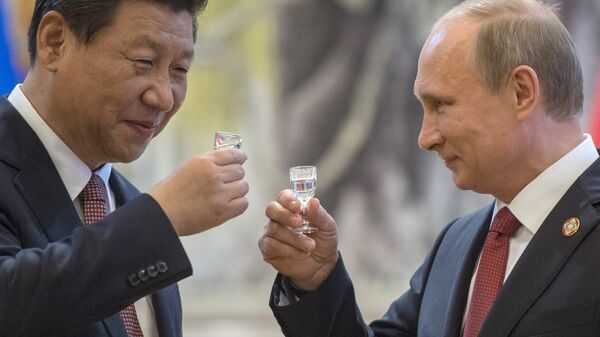The expert from the Institute of International Studies at Fudan University Feng Yujun said that in the context of internal problems in a number of developing countries, turbulence in regional security, and changes in international rules and regulations the situation in the world today is the most difficult since the Cold War.
“Russia and China have a comprehensive strategic partnership, so it is important for them to strengthen cooperation in all fields and areas. First of all, it is important to reveal the inner potential of such bilateral cooperation, in order to maintain stability inside the countries, as well as continuously develop economic cooperation, overcoming existing difficulties in the economic sphere,” Yujun told Sputnik China.
Talking about one way to maintain cooperation, the expert said that “Currently, we are commissioned to work on the issue of pairing, by enhancing bilateral relations and dialogue, which is a global problem. To implement both the initiatives, closer communication between the Russian and Chinese government and academia is needed.”
He also said that apart from communicating with each other, both the countries must refer to the experience of the economic cooperation of the last 20 years. According to him, promoting trade cooperation in the World Trade Organization (WTO) charter is also a very important principle.
Talking about the situation in the Korean Peninsula and security of the whole of Northeast Asia, the expert said that the nuclear issue of the Korean peninsula has been in place for a long time now and it has not resolved, on the contrary it has gotten worse over time.
“North Korea continues to increase the pace of development of its nuclear weapons and missiles. Meanwhile, the United States, South Korea and Japan on the pretext of the existence of the North Korean nuclear issue, have strengthened cooperation within the alliance,” Yujun said.
On the one hand, there is a need to focus attention and energy on resolving the nuclear issue of the Korean Peninsula and to accelerate the process of its denuclearization. But then again, it is also necessary to consider the security issue in Northeast Asia as a whole.
“It is necessary to reflect on how to create a comprehensive balanced security model in the Northeast Asia, taking full account of the interest of each party. This will be the key to success for achieving regional security in the future. If we only think about our own safety, it will just add tension and increase instability in the whole region,” Yujun concluded.




